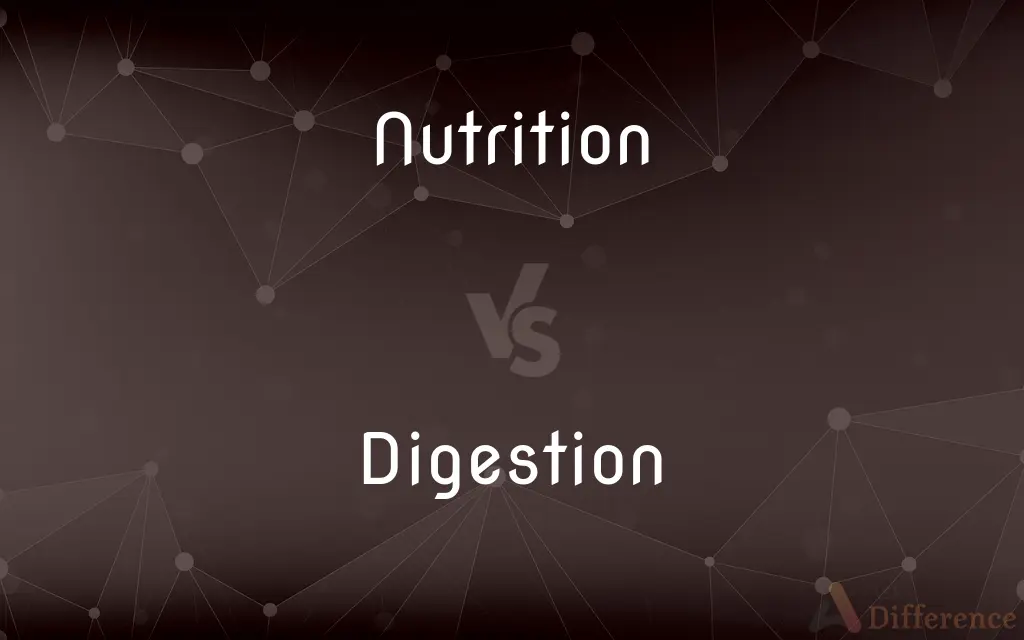Nutrition vs. Digestion — What's the Difference?
By Tayyaba Rehman & Fiza Rafique — Updated on May 2, 2024
Nutrition involves the intake and use of nutrients from food, focusing on what is eaten; digestion is the physical and chemical process of breaking down food in the body.

Difference Between Nutrition and Digestion
Table of Contents
ADVERTISEMENT
Key Differences
Nutrition encompasses the overall process of food intake, nutrient absorption, and its use for energy, growth, and cellular repair. On the other hand, digestion specifically refers to the mechanical and chemical breakdown of food that occurs in the digestive system, starting from ingestion and continuing through to absorption.
In terms of function, nutrition focuses on the types of nutrients consumed and their impact on health, covering aspects like vitamins, minerals, proteins, fats, and carbohydrates. Whereas, digestion is concerned with how the body processes these nutrients, involving enzymes and digestive fluids that break down foods into smaller, absorbable components.
Nutrition is a broader field that includes the study of nutrient requirements, healthy eating habits, and dietary planning to prevent and manage diseases. On the other hand, digestion is a more focused area that examines the efficiency and problems related to the gastrointestinal system, including disorders like indigestion and irritable bowel syndrome.
Nutritional science also looks at how nutrients affect metabolism, immune system function, and overall health. In contrast, digestion studies the specific mechanisms of the gastrointestinal tract, such as movement, enzyme secretion, and nutrient absorption.
While nutrition can influence long-term health outcomes such as heart disease, diabetes, and obesity, digestion primarily impacts immediate gastrointestinal health, which can affect nutrient absorption and, consequently, overall nutritional status.
ADVERTISEMENT
Comparison Chart
Focus
Intake and use of nutrients
Breakdown of food into nutrients
Scope
Broad (eating habits, nutrient absorption)
Specific (mechanical and chemical processes)
Health Impact
Long-term (disease prevention, health maintenance)
Immediate (gastrointestinal function)
Related Disorders
Malnutrition, obesity, vitamin deficiencies
Indigestion, IBS, gastrointestinal diseases
Key Processes
Metabolic pathways, immune system enhancement
Enzymatic breakdown, nutrient absorption
Compare with Definitions
Nutrition
The process of providing or obtaining the food necessary for health and growth.
Proper nutrition is vital for children’s development.
Digestion
The chemical or mechanical process of breaking down food.
Stomach acids aid in the digestion of our meals.
Nutrition
The branch of science that deals with nutrients and nutrition, particularly in humans.
She studies nutrition to better understand dietary needs.
Digestion
The process of digesting food.
Digestion begins in the mouth with the act of chewing.
Nutrition
An alimentary or nutritious substance.
Fiber is an important nutrition component for digestive health.
Digestion
The biological process by which complex food is converted into simpler absorbable forms.
Good digestion is essential for adequate nutrient uptake.
Nutrition
The intake of food considered in relation to the body’s dietary needs.
Good nutrition involves a balanced diet rich in fruits and vegetables.
Digestion
Digestion is the breakdown of large insoluble food molecules into small water-soluble food molecules so that they can be absorbed into the watery blood plasma. In certain organisms, these smaller substances are absorbed through the small intestine into the blood stream.
Nutrition
The assimilation by organisms of food materials that enable them to grow, maintain themselves, and reproduce.
Nutrition plays a key role in animal fitness and survival.
Digestion
The process by which food is converted into substances that can be absorbed and assimilated by a living organism. In most animals it is accomplished in the digestive tract by the mechanical and enzymatic breakdown of foods into simpler chemical compounds.
Nutrition
Nutrition is the biochemical and physiological process by which an organism uses food to support its life. It includes ingestion, absorption, assimilation, biosynthesis, catabolism and excretion.The science that studies the physiological process of nutrition is called nutritional science (also nutrition science).
Digestion
The ability to digest food.
Nutrition
The process of nourishing or being nourished, especially the process by which a living organism assimilates food and uses it for growth and for replacement of tissues.
Digestion
(Biochemistry) The process of decomposing complex organic substances into simpler substances, as by the action of enzymes or bacteria.
Nutrition
The science or study that deals with food and nourishment, especially in humans.
Digestion
(Chemistry) The process of softening or disintegrating by means of chemical action, heat, or moisture.
Nutrition
A source of nourishment; food.
Digestion
Assimilation of ideas or information; understanding.
Nutrition
(biology) The organic process by which an organism assimilates food and uses it for growth and maintenance.
Digestion
The process, in the gastrointestinal tract, by which food is converted into substances that can be utilized by the body.
Nutrition
That which nourishes; nutriment.
I accidentally ate a worm which was in my apple - my uncle said the extra nutrition would do me good.
Digestion
The result of this process.
Nutrition
In the broadest sense, a process or series of processes by which a living organism as a whole (or its component parts or organs) is maintained in its normal condition of life and growth.
Digestion
The ability to use this process.
Nutrition
In a more limited sense, the process by which the living tissues take up, from the blood, matters necessary either for their repair or for the performance of their healthy functions.
Digestion
The processing of decay in organic matter assisted by microorganisms.
Nutrition
That which nourishes; nutriment.
Fixed like a plant, on his peculiar spot,To draw nutrition, propagate, and rot.
Digestion
The assimilation and understanding of ideas.
Nutrition
(physiology) the organic process of nourishing or being nourished; the processes by which an organism assimilates food and uses it for growth and maintenance
Digestion
Generation of pus; suppuration.
Nutrition
A source of materials to nourish the body
Digestion
(chemistry) Dissolution of a sample into a solution by means of adding acid and heat.
Nutrition
The scientific study of food and drink (especially in humans)
Digestion
The act or process of digesting; reduction to order; classification; thoughtful consideration.
Digestion
The conversion of food, in the stomach and intestines, into soluble and diffusible products, capable of being absorbed by the blood.
Digestion
Generation of pus; suppuration.
Digestion
The process of decomposing organic matter (as in sewage) by bacteria or by chemical action or heat
Digestion
The organic process by which food is converted into substances that can be absorbed into the body
Digestion
Learning and coming to understand ideas and information;
His appetite for facts was better than his digestion
Digestion
The breakdown of food into smaller components that can be absorbed into the bloodstream.
Enzymes play a crucial role in the digestion of proteins.
Digestion
The capacity of the body to break down food and convert it into energy.
He has a fast digestion, which allows him to eat frequently.
Common Curiosities
How does poor digestion affect nutrition?
Poor digestion can lead to malabsorption of nutrients, negatively affecting nutritional status and overall health.
Can nutrition influence digestive health?
Yes, proper nutrition, including adequate fiber and fluids, can significantly improve digestive health and function.
What is the relationship between nutrition and digestion?
Nutrition and digestion are interlinked; good digestion is crucial for proper nutrition as it ensures nutrients from food are efficiently absorbed.
Why is understanding both nutrition and digestion important for health?
Understanding both concepts helps in making informed dietary choices that support both overall health and optimal digestive function.
What common digestive disorders can affect nutritional status?
Disorders like Crohn’s disease, celiac disease, and irritable bowel syndrome can impair the body’s ability to digest food and absorb nutrients, impacting nutritional health.
What role does digestion play in weight management?
Efficient digestion helps in optimal nutrient absorption and metabolism, both of which are key for maintaining a healthy weight.
How do digestive enzymes relate to nutrition?
Digestive enzymes are crucial for breaking down food into nutrients that the body can absorb and use for energy, growth, and cellular repair.
Can changes in diet improve digestive disorders?
Yes, dietary adjustments such as increasing fiber intake, reducing fatty foods, and avoiding specific irritants can alleviate symptoms of many digestive disorders.
What is the impact of overnutrition on digestion?
Overnutrition can lead to digestive discomfort and conditions like gastroesophageal reflux disease (GERD), as the body struggles to process excessive amounts of food.
What nutrients are particularly important for healthy digestion?
Fiber, fluids, and probiotics are essential for maintaining healthy digestion by promoting regular bowel movements and a balanced gut microbiota.
How does the body regulate digestion to optimize nutrition?
The body regulates digestion through hormonal signals and neural mechanisms that ensure food is broken down at the right rate to maximize nutrient absorption.
Share Your Discovery

Previous Comparison
Stethoscope vs. Telescope
Next Comparison
Volkswagen vs. VolvoAuthor Spotlight
Written by
Tayyaba RehmanTayyaba Rehman is a distinguished writer, currently serving as a primary contributor to askdifference.com. As a researcher in semantics and etymology, Tayyaba's passion for the complexity of languages and their distinctions has found a perfect home on the platform. Tayyaba delves into the intricacies of language, distinguishing between commonly confused words and phrases, thereby providing clarity for readers worldwide.
Co-written by
Fiza RafiqueFiza Rafique is a skilled content writer at AskDifference.com, where she meticulously refines and enhances written pieces. Drawing from her vast editorial expertise, Fiza ensures clarity, accuracy, and precision in every article. Passionate about language, she continually seeks to elevate the quality of content for readers worldwide.
















































